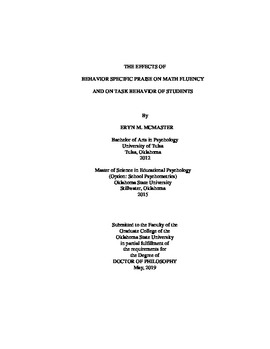| dc.description.abstract | One mission of schools is to assist children in developing cognitive skills, in order to become well-functioning, productive contributors to their community and society as a whole (Abbott, O'Donnell, Hawkins, Hill, Kosterman, & Catalano, 1998). While providing students with academic instruction, it is important to consider the variance in student performance. One variable that can account for such variance is classroom management and opportunities for learning (Abbott et al., 1998). Classroom management is a major contributing factor to successful student learning, as well as active engagement in the classroom. In addition, research indicates that there is a link between effective classroom management strategies and positive outcomes, including an increase in on-task behavior and academic engagement (Leflot et al., 2010; Reinke, Lewis-Palmer, & Merrell, 2008). The use of verbal praise in the classroom allows for more instructional time, increased student intrinsic motivation, facilitates students' feelings of competence (Sutherland et al., 2000), and increased appropriate behaviors in students who witness other students being praised for appropriate behaviors (Kern & Clemens, 2007). The present study examined the use of behavior-specific praise (BSP) statements on math fluency and on-task behavior of students. The study sought to determine if BSP would increase math fluency, as well as the on-task behavior of students. Forty fourth-grade students participated in the study and were randomly assigned to the treatment group (received behavior-specific praise statements) or the control group (no praise statements). Results of the study indicated that significant differences were found within-subjects over time, indicating that explicit timing is an effective math fluency intervention. Additionally, results indicated that students performing in the frustrational range (< 20 Digits Correct per Minute), benefit more from BSP, than those performing above the frustrational level. However, there were no significant differences found for the between-subjects variables of group and time. Limitations and future implications for research are discussed. | |
